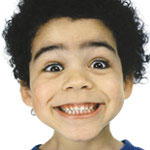
If you walk past your child’s bedroom at night and hear a loud, wince-inducing grating noise, she is probably grinding her teeth.
Teeth grinding is more common in children than you think. An estimated 3 out of 10 kids grind their teeth before reaching age 5. It’s usually no cause for alarm, and most children outgrow it by the time they reach age 6. Most of the times, teeth grinding occurs because of teething or improper tooth alignment.
However, sometimes the teeth grinding can continue. If your child is older than 6 years and wakes up regularly with a sore jaw or is teased by sleepover friends or siblings who heard gnashing sounds at night, your child may have bruxism — the medical term for habitual grinding or clenching teeth.
Causes of teeth grinding
What causes teeth grinding, and what can you do to help?
No one knows exactly why some kids grind their teeth. Stress can be a contributing factor – and while stress and anxiety can contribute to teeth grinding, there is no known connection between behavioral problems and bruxism.
What to do if your child is teeth grinding
If your child has a sore mouth or headaches from grinding his teeth, here are some helpful tips:
- Look for the source. Stress can make kids grind their teeth at night, whether it’s thinking about upcoming exams or a problem with a teacher or the playground bully. Talk to your child to find out what’s bothering him. Then help him find a solution to the problem.
- Rely on relaxation. Help your child develop a relaxing pre-bedtime routine. A warm shower, relaxing music, deep breaths or a peaceful book may help your child fall asleep in a more relaxed way.
- See the dentist. Your child’s dentist can determine if the bruxism is affecting her teeth. A specially fitted mouth guard (similar to sports mouth guards) may be necessary.

If you walk past your child’s bedroom at night and hear a loud, wince-inducing grating noise, she is probably grinding her teeth.
Teeth grinding is more common in children than you think. An estimated 3 out of 10 kids grind their teeth before reaching age 5. It’s usually no cause for alarm, and most children outgrow it by the time they reach age 6. Most of the times, teeth grinding occurs because of teething or improper tooth alignment.
However, sometimes the teeth grinding can continue. If your child is older than 6 years and wakes up regularly with a sore jaw or is teased by sleepover friends or siblings who heard gnashing sounds at night, your child may have bruxism — the medical term for habitual grinding or clenching teeth.
Causes of teeth grinding
What causes teeth grinding, and what can you do to help?
No one knows exactly why some kids grind their teeth. Stress can be a contributing factor – and while stress and anxiety can contribute to teeth grinding, there is no known connection between behavioral problems and bruxism.
What to do if your child is teeth grinding
If your child has a sore mouth or headaches from grinding his teeth, here are some helpful tips:
- Look for the source. Stress can make kids grind their teeth at night, whether it’s thinking about upcoming exams or a problem with a teacher or the playground bully. Talk to your child to find out what’s bothering him. Then help him find a solution to the problem.
- Rely on relaxation. Help your child develop a relaxing pre-bedtime routine. A warm shower, relaxing music, deep breaths or a peaceful book may help your child fall asleep in a more relaxed way.
- See the dentist. Your child’s dentist can determine if the bruxism is affecting her teeth. A specially fitted mouth guard (similar to sports mouth guards) may be necessary.